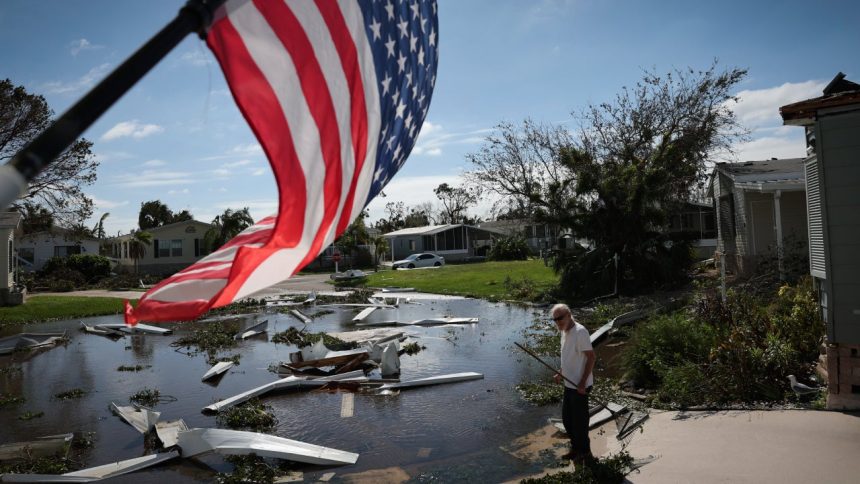For the first time in seven years, the Florida home insurance market is turning a profit and new insurance carriers have entered the state. Many industry insiders say this indicates that the recent legislative changes are working and the insurance market is showing signs of stabilization. However, with over two months left of what was initially forecasted to be a record-breaking hurricane season, many homeowners are wondering if the Florida homeowners insurance market is strong enough to withstand another hit.
“Heavy loss activity in Florida during the 2024 Atlantic hurricane season could have a negative impact on the market’s recovery,” says Mark Friedlander, director of corporate communications at the Insurance Information Institute, “but insurers are well-positioned with adequate levels of capital and reinsurance to weather the storms.”
Not everyone agrees that the Florida property market is approaching solid ground yet or that market stabilization will trickle down real savings to policyholders. Even in a healthy insurance market, home insurance premiums usually increase slowly over time. With the current average cost of Florida home insurance at $5,531 per year for $300,000 in dwelling coverage, most homeowners are hoping to see rates decrease drastically.
Regarding the market’s current state, Rep. Spencer Roach of Florida says, “I would categorize it somewhere between cautious optimism and wishful thinking. Only time will tell.”
What is the state of the Florida insurance market today?
According to reports by the Florida Office of Insurance Regulation (OIR), the home insurance market is on the upswing. Thanks to sweeping legislative reforms over the past two years, eight new carriers have entered the market and insurers turned a profit in the first quarter of 2024 — $266 million in net income profits and $160 million in net underwriting profits.
Through the Depopulation Program, Citizens Property Insurance has moved over 400,000 policies to the private insurance market in the past year. Litigation and legal system abuse are also on the downturn, which may be why nine carriers filed for rate reductions in 2024.
“The highest rate reduction filing is for a 6.9 percent decrease by American Integrity Insurance Co.,” says Friedlander. “The average 2024 rate filing with the state’s insurance regulator is less than a 2 percent increase, the lowest average in the U.S. year-to-date.”
Florida insurers are passing along savings to their customers due to their reduction in defense containment cost expenses because of legislative reform.
— Mark Friedlander, Director, Corporate Communications, Insurance Information Institute
Florida homeowners insurance carriers filing for rate reductions in 2024
- American Integrity Insurance Company of Florida
- American National Property & Casualty Company
- Florida Peninsula Insurance Company
- Heritage Property & Casualty Insurance Company
- Safe Harbor Insurance Company
- Southern Oak Insurance Company
- Spinnaker Insurance Company
- Stillwater Property and Casualty Insurance Company
- U.S. Coastal Property & Casualty
Florida homeowners insurance carriers filing for zero rate increases in 2024
- American Bankers Insurance Company of Florida
- American Integrity Insurance Company of Florida
- American Security Insurance Company
- American Traditions Insurance Company
- Castle Key Insurance Company
- Castle Key Indemnity Company
- Edison Insurance Company
- Florida Farm Bureau General Insurance Company
- Florida Family Home Insurance Company
- Heritage Property & Casualty Insurance Company
Legislative changes in the Florida insurance market
Insurance is a heavily regulated product, but there is a difference between regulation and complete control. The degree to which insurance commissioners can take a more active or passive stance on policy regulation varies between states. However, most commissioners cannot force massive changes, such as setting carrier rates, without an act of law passed by the state legislator.
When states pass laws that limit a carrier’s ability to make a profit, insurance companies may decide to drop policies or withdraw from the state. This usually results in policyholders having limited options and higher premiums.
Therefore, insurance commissioners and state legislators must strike the right balance with insurance companies, especially in a high-risk state like Florida. The goal is to have laws in place that protect policyholders’ right to fair treatment and affordable access while simultaneously promoting competition and ensuring the financial stability of insurers within the market.
Aside from extreme weather financially impacting the South disproportionally more than the rest of the nation, other significant issues that have plagued Florida for decades include:
Gov. Ron Desantis and the Florida legislature have passed laws that address these issues from several angles. The 2024 legislative session passed eight new bills, ranging from flood disclosures to insurance data reporting. Read more about each new law from the 2022, 2023 and 2024 legislative sessions below. A full description of recent property law changes can be found on MyFloridaCFO.
Future of the Florida home insurance market
“Everything depends on the rest of this hurricane season, and we are approaching the most dangerous time,” says Rep. Roach.
Rep. Roach knows firsthand how homeowners in Florida feel when they are left waiting for an insurance payment after a company becomes insolvent. Hurricane Ian was his first time experiencing hurricane damage to his own property. Until then, the area where he lived had never flooded.
”In Florida, having a paper insurance policy doesn’t mean that you actually have insurance. Having insurance doesn’t guarantee that you will be indemnified for your loss — in the event of a major storm, it’s entirely possible that your insurance company will simply close their doors and leave the state. That’s exactly what happened to me and so many of my constituents.
”My home insurance company, which was UPC, went into receivership and a lot of us felt like we were stuck holding the bag,” Rep. Roach says. “Sadly, this isn’t a unique situation and what often has to happen is that the taxpayers end up footing the bill through [the Florida Insurance Guaranty Association] FIGA.”
Bankrate’s Extreme Weather Survey found that 13 percent of Southern homeowners said they felt very financially unprepared and 16 percent said they felt somewhat financially unprepared for the potential costs associated with extreme weather events in their area, more than homeowners in any other region. Rep. Roach’s experience underscores how easily it can happen.
With no insurance money coming in and no idea if it ever would, he had to charge about $40K on credit cards within the first month after the storm. Contractors wouldn’t start water remediation or rebuilding his home without each receiving a $10K down payment, and since Federal Emergency Management Agency trailers were so scarce, he needed to purchase his own trailer to live in for the nine months construction was underway.
In an effort to secure the future of Florida home insurance, some homeowners may get lost in red tape and legal jargon. Many of the changes involve how insurance carriers and adjusters can handle claims and other types of government oversight. While it is important for Floridian homeowners to understand how these changes impact them, most only have two concerns: Will I be able to afford my insurance policy, and will my insurance company be there for me when I need them?
Are Florida’s new insurance companies trustworthy?
“Many people think that the only measure of the health of Florida’s insurance market is the number of policies we are removing from Citizens, and I think that’s absolutely the wrong approach and the wrong message,” says Rep. Roach. “Having nine companies come into Florida is a big win; I don’t want to marginalize that.”
But we’re trying to pretend that there’s some magic number of new companies that are going to come in and relieve the burden of Citizens in the free market. What we have to look at is the underlying health of these companies that are coming in and the ability of these companies to pay claims when a catastrophic event occurs.
— U.S. Rep. Spencer Roach, R-North Fort Myers
Florida has a long history of insurance companies collecting premiums from homeowners for years and then going insolvent after a large hurricane hits. Financial rating firms like AM Best and Demotech offer insight into the solvency of insurance companies, but that isn’t a guarantee that a company can’t go under.
In 2021, six insurance companies with an A (Excellent) rating from Demotech went insolvent. A spike in legal system abuse may have contributed. According to Joe Petrelli, president of Demotech and co-founder of 4WARN, these companies had enough reinsurance for catastrophic losses but were “litigated to death.”
House Bill 837, also known as the tort reform bill, has helped reduce the number of property claim lawsuits filed in Florida. However, some have lost faith in the current rating system and feel that a new approach is warranted.
While Demotech, AM Best, KBRA and S&P are considered independent rating firms, insurance companies pay a fee to be included. On the other hand, Weiss Ratings does not.
“Weiss has never accepted, and never will accept, compensation in any form from the companies it rates for issuing its ratings,” says Dr. Martin Weiss, founder of Weiss Ratings and chairman of the board. “Nor does it accept ads from any companies on its site. The only business model that can assure continuing objectivity and accuracy is one that’s based on complete independence — not just for revenues but also for data.”
Rep. Hillary Cassel of Florida co-sponsored House Bill 1661 with Rep. Roach, which would require insurance companies to include ratings from firms that do not receive payments from the companies they rate. While the bill died in the subcommittee, it is planned to be submitted again next year.
“Each of the nationally recognized statistical rating organizations registered with the U.S. Securities and Exchange Commission uses the ‘rated entity pays’ business model,” says Petrelli. “Demotech reviews reinsurance, catastrophe response programs, disaster recovery programs and other non-public information. Weiss does not do so, as they do not interact with management.”
According to Dr. Weiss, Weiss Ratings currently takes extreme weather into account. “Our rating model applies moderate and severe stress tests to all major areas,” says Weiss, “including capital adequacy, asset quality, liquidity and more. Another appropriate term for ‘severe stress tests’ is ‘catastrophe modeling.’”
Most of the new insurance companies entering the Florida market were granted a financial stability rating (FSR) of A (Excellent) by Demotech. While a few have FSR ratings from Demotech and KBRA, Slide is the only new company that is rated by both Weiss and Demotech. Demotech gave Slide an A rating, and Weiss gave it a D+.
Financial stability ratings comparison
| Insurance company | Demotech | Weiss | KBRA |
|---|---|---|---|
| American Coastal Insurance Co. | A | D+ | A- |
| Castle Key Insurance Co. | A | B | Not rated |
| Heritage Property & Casualty Insurance Co. | A | D+ | BBB+ |
| Homeowners Choice Property & Casualty Insurance | A | C- | Not rated |
| Southern Oak Insurance Co. | A | C | Not rated |
Can Florida homeowners still file legitimate lawsuits against their insurance companies?
Ideally, homeowners insurance will pay out covered claims in a fair and timely manner. If it doesn’t, carriers have processes in place for claims to be reviewed and settled outside of court. However, sometimes litigation is the only recourse homeowners have. Florida’s new laws make it more challenging for homeowners and business owners to file suit.
“If I commit fraud against my insurance company, I can go to jail,” says Rep. Roach. “If my insurance company commits fraud against me, the only recourse I have is to sue, and increasingly, we’re making it much harder for Floridians to use that leverage as an incentive to force these insurance companies who otherwise would not pay out a claim, to pay that claim.”
By eliminating one-way attorney fees, lawyers are less likely to take on property insurance cases due to the expense and time involved. While this will discourage nuisance suits, homeowners with legitimate claims will have a harder time finding a lawyer to take the case and will have to pay for the lawyer themselves. In addition, Florida law now prohibits homeowners from assigning their insurance benefits to a third party who does have the means to pursue a case in court.
Will homeowners see rate decreases in Florida?
“House Bill 7073, the elimination of the insurance premium taxes, is a very positive piece of legislation,” says Rep. Roach. “Between carriers cutting insurance rates by 1.75 percent and policyholders receiving a rebate of the same amount, it is projected to save Florida homeowners $502 million over two years.”
Bankrate’s analysis of rate data from Quadrant Information Services shows that Florida homeowners insured with $300K in dwelling coverage saw a $654 premium decrease between January 2024 and September 2024. While this is great news, it’s important to keep in mind that the state-mandated 1.75 percent reduction in premium for home and flood policies is a temporary, one-year reduction. In addition, Citizens was approved for a rate increase averaging 14 percent effective January 1, 2025.
The rate reduction some homeowners may be experiencing could be attributed to the recent rate filings and legislation reform, as well as to the amount of homeowners leaving the insurance market altogether.
As of September 2024, the average cost of home insurance in Florida for $300K in dwelling coverage is $5,531, which is 142 percent higher than the national average.
Will Mother Nature give Florida enough time to turn it around?
Property insurance in Florida is complex, with many moving parts. A lot has to go right and stay that way before we can see how these changes really affect homeowners and insurance premiums. The hardest, but possibly the most influential, factor to predict is extreme weather.
Florida went without a hurricane for 11 years, from 2005 to 2016. If it can hit another lucky hurricane-free streak, this could potentially buy time for carriers to build up the surplus needed to return Florida’s home insurance market to solid ground.
Read the full article here















